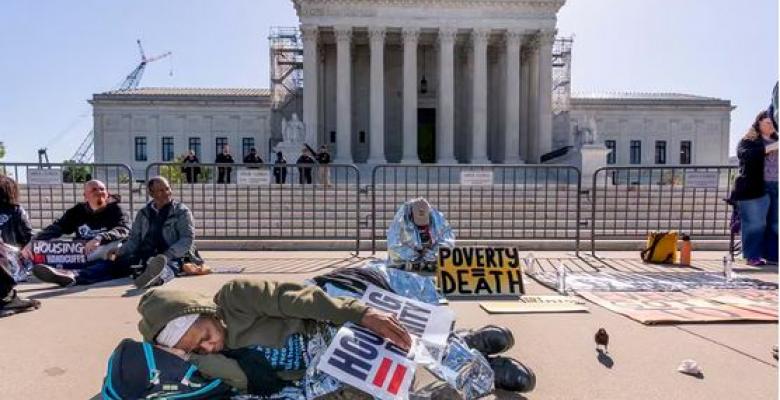Destitution, Nothing Strange in “Paradise”
especiales

A few months before elections in which he hopes to continue his mandate, the US president, Joe Biden, has just glimpsed one of his campaign promises from four years ago: investing 7 billion dollars in the reactivation of clean energy - something which Donald Trump never did in his time in office -, recognizing the threat of climate change and belatedly pointing out the need for help to the poorest, when the record for the largest number of homeless people in the richest country in the world has just been established.
This becomes even more relevant, when this Monday, April 24, the Supreme Court of Justice analyzes a ruling that considers it cruel and unconstitutional to penalize someone for sleeping outdoors, a situation in which approximately 650,000 people in the country officially find themselves, a figure well below what’s real, because it responds to a survey carried out in January, with at least two million people fleeing from the cold for several hours in shelters.
The case comes after the number of homeless people in the United States grew 12% to its highest level reported, as rising rent prices and a decline in assistance combined to put housing out of reach for more people. Four out of ten homeless people sleep outdoors, mostly black, gay and elderly, according to a federal report.
Two of the four states with the largest homeless populations in the country, Washington and California, are in the West. Officials in cities like Los Angeles and San Francisco say they don't want to punish people simply because they are forced to sleep outdoors, but that cities need to be able to keep growing encampments under control.
OBJECTED COUNTING
Organizations that defend the homeless criticize that the counts are carried out in January, when due to the cold many people concentrate in places where they can find shelter, even if it’s not really their home, as noted in an article in the San Francisco Chronicle newspaper.
The media stressed that if the counting were to be done in a warmer month, more people would be identified who subsist outdoors, for the sole reason that it’s more feasible to resist the lashes of the weather. And he also criticized that it’s not done in many places where there are homeless populations, so it’s not comprehensive.
Furthermore, the Department of Education itself has documented that there are currently 1.2 million homeless students in the country, a figure that doubles the officially accepted number of homeless people, which is why many of these young people and children do not fall into the formal definition of destitute.
They, without a doubt, experience the problem of living in unfavorable conditions in motels or in houses that receive them temporarily, and are a factor of serious social deterioration, since this condition increases their risks of falling into school dropouts, gangs and addictions.
MAXIMUM HUMILIATION
Being homeless is for many the ultimate humiliation. Hit rock bottom and stay there, unable to go back up. In the United States, with a society so deeply individualistic and where success and worth are expressed in terms of consumer power, the homeless are at the bottom of the list.
They are those stigmatized by defeat, the irredeemable losers, those who did not stand up to the standard. And although such categorization has implicit a kind of collective deception and intrinsic injustice, these prejudices and structural conditions persist and operate to keep or throw more people onto the streets. Many, without hope, resign themselves to destitution, in a chronic state.
Not having a permanent home and having to survive living in shelters, in vehicles, in precarious accommodation or even in the open, is the fate of hundreds of thousands of people in the United States, numbers that in many places - such as New York – have reached levels higher than those officially admitted.
Translated by Amilkal Labañino / CubaSí Translation Staff













Add new comment